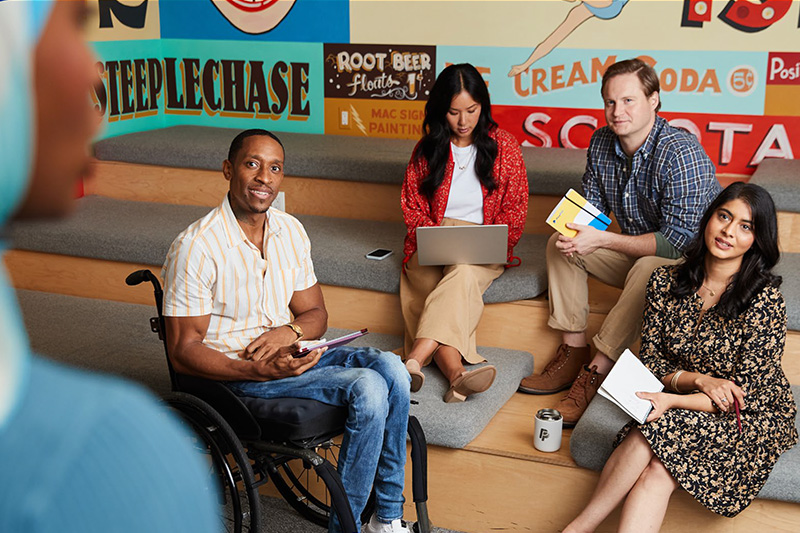by Ivy K. Lau-Schindewolf, Public Affairs and Strategic Research Lead Manager

The PayPal Employee Financial Diaries1 research study captures the voice and experiences of our employees to explore how the PayPal Employee Financial Wellness Program has contributed to their journey toward financial health. The study follows a cohort of 22 employees who participated in a 17-month long Financial Diaries study, between December 2020 and April 2022. The goal of the research is to provide learnings into the opportunities that employers have to influence jobs, benefits, and culture to facilitate the workers’ journey toward becoming financially well.
The PayPal Employee Financial Wellness Program, launched in December 2019, is designed to benefit hourly and entry level employees. The four pillars of the program are: wage increases, reduction in health care premiums, equity grants, and financial coaching resources.
The Diaries research shows that study participants have made strong progress towards financial wellness since joining PayPal. For the most part, the employees who participated in the study came to PayPal with high debt, low savings, no investments, and poor financial confidence. Over the last few years, nearly all have made progress – decreasing debt, increasing savings, establishing new investment portfolios, and gaining the ability to share financial knowledge with their colleagues.
Over the course of the research study, all employees who participated in the Diaries research study improved their debt-to-equity ratio, which dropped by 20% on average. They have also weathered unexpected expenses with more resilience and a wider range of options. A few purchased a home. 83% of Diaries respondents said they would now have an easier time covering an unexpected expense of $1,000.
There have also been shifts in the Diaries participants' financial identity. Having become equity owners for the first time, many Diaries participants experienced a re-orientation in their financial identity as financially capable people who are investors (and not just debtors). Their time horizon for financial decision-making has expanded. They are motivated to save more and pay down debt in order to invest more. The sense of agency and ownership of their financial future propelled Diaries participants to prioritize and achieve their financial goals.
Peer learning and peer coaching played an important role in financial knowledge exchange and capacity building, and culture making. For example, team stand-up meetings included a 5-minute segment on budgeting tips, and many employees started contributing to a 401(k) plan due to the encouragement of a team leader or coworker. Knowledge exchange amongst peers lowered entry barriers, made complex topics such as investing more accessible, and progress felt more possible when there were companions on the journey.
While the improvement in financial wellness can in part be explained by having a steady job and good benefits, the Employee Financial Wellness Program accelerated their progress towards achieving financial wellness: Equity added to the asset ledger of the employees’ balance sheet. Many Diaries participants are taking advantage of more affordable health insurance to manage medical and mental wellness issues that previously decreased their ability to work and increased their medical debt. They have gained confidence and capacity to manage their day-to-day finances in ways that allow them to prepare and dream for the future.
The journey towards financial wellness is a non-linear process that takes time, and a key role of the employer is to measure what matters, and to facilitate and support the employees’ journey.
In addition to offering steady pay and competitive benefits, employers could implement financial wellness programs with an eye towards culture. Thoughtful and consistent communication around the company mission and values over the years has contributed to a strong foundation for a workplace culture in which employee financial wellness can be cohesively embedded in company practice and employee experience, in ways that went far beyond the four pillars of the program.
The findings from the Diaries interviews mirror company-wide trends. The estimated net disposable income (eNDI) – a PayPal-defined metric that calculates discretionary income remaining for employees after taxes and typical expenses are paid – for hourly and entry level U.S. employees went from 4-6% in FY19 to 11% in FY20 and 15% in FY 21.1The 401 (k) enrollment of hourly and entry-level U.S. employees increased from 70.6% in 2019 to 77% in 2022, and their average annual 401(k) contribution increased by nearly 20% between 2019 and 2022.
You can access the full report here. To learn more, you can read this case study in the MIT Sloan School of Management teaching library as well as the Worker Financial Wellness Initiative that PayPal is driving in collaboration with JUST Capital, Financial Health Network, and the Good Jobs Institute.
1PayPal hired a third-party researcher, Dr. Daryl Collins, co-creator of the U.S. Financial Diaries, as the principal investigator of the research. Dr. Collins alone knows the names of the research participants. In this report, all data and stories are shared on an anonymized and de-identified basis. All names and personal details have been changed to protect the privacy of the study participants.